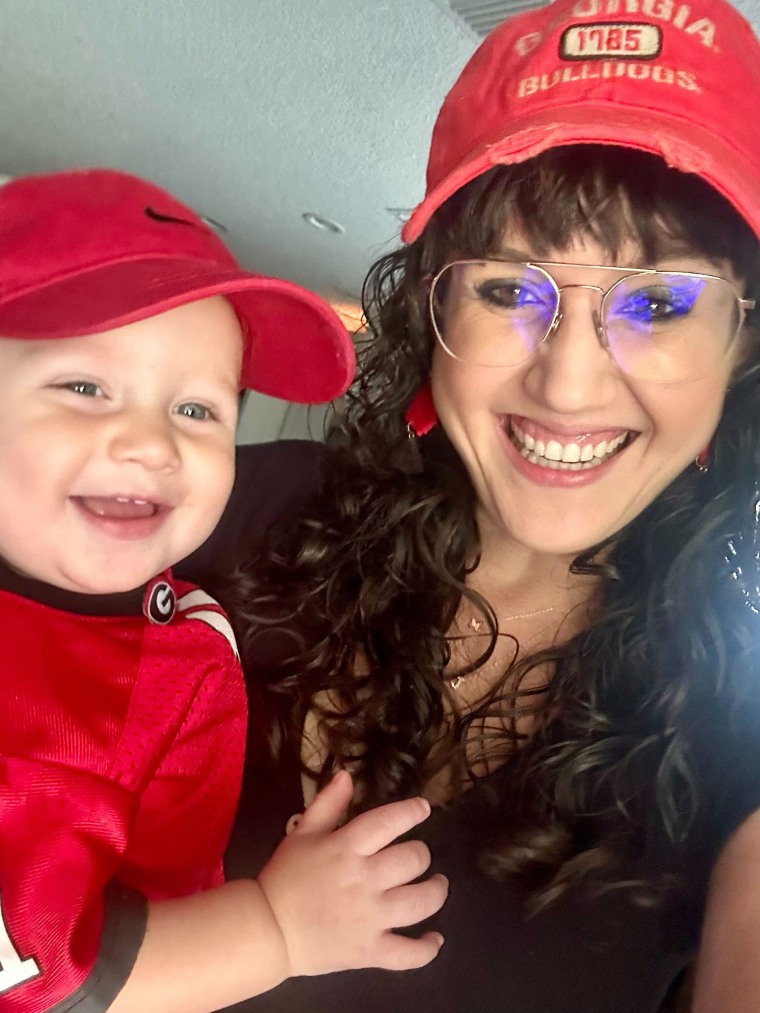Courtney Akin, 30, started buying convenient applesauce pouches for her son, Jaxson, in July 2023. It wasn’t until September, at his 12-month checkup, that she got her first hint that something might be off.
"We'd been purchasing (the pouches) for a while," Akin told NBC News this week. The snacks, sold by brand WanaBana, seemed healthy and were marketed as gluten-free, preservative-free and with no sugar added, recalled Akin, who lives in Folkston, Georgia.
Plus, her son "loved them," she said.
But routine tests at that 12-month checkup revealed Jaxson had a worrying amount of lead in his blood. At first, the results were confusing. "He's 1 year old at the time, and he goes to day care," Akin said. "So he's not grabbing his tool belt and, you know, going mining every day."
However, follow-up testing confirmed that Jaxson had 5.2 micrograms of lead per deciliter in his blood. While there's no safe blood level of lead for children, the Centers for Disease Control and Prevention consider a child with 3.5 micrograms per deciliter or above to have more lead in their blood than most.
When the pouches were recalled in October for possible lead contamination, Jaxson's test results finally started to make more sense, Akin said.
A family member sent her a screenshot of a news report about the applesauce pouch recall. Just a few days earlier, she'd purchased more at Dollar Tree and had the apple cinnamon flavor sitting on her counter. (A spokesperson for Dollar Tree has previously said the retailer has since removed the product from its shelves and locked registers to prevent sales.)
After that, Akin stopped giving him the pouches. And, over the next few months, "Lo and behold, his levels went back to normal," she said.
Still, Akin, who breastfed her son for 13 months, felt guilty.
"Working as hard as I did nursing that long, and then I go and purchase lead pouches. ... I feel terrible that I fed that to my son," she said.
By November 2023, the Food and Drug Administration had recalled two more brands of applesauce pouches for lead contamination and launched an investigation into where the lead was coming from. In December, the FDA said it was likely that a cinnamon supplier was the source of the lead contamination in the WanaBana pouches. (WanaBana did not immediately respond to request for comment.)
To date, the CDC has counted 111 confirmed cases of lead and/or chromium poisoning in connection with the applesauce pouch recall, as well as another 320 probable cases and 37 suspected cases.

Symptoms of lead poisoning or exposure
In many cases, there are no apparent symptoms of lead exposure among children, the CDC says. A blood test is typically the only way to know that a child has been exposed to lead.
Symptoms become more common at higher levels of lead exposure, the Mayo Clinic says, and the signs of lead poisoning may include:
- Learning difficulties
- Developmental delays
- Loss of appetite
- Weight loss
- Irritability
- Fatigue or sluggishness
- Constipation
- Vomiting
- Stomach pain
While Jaxson didn't show behavioral changes or any other noticeable symptoms related to his elevated blood level of lead, other parents told NBC News that they have seen differences in their children after eating the pouches.
Alyssa Magnuson, 29, from Braham, Minnesota, told NBC News that daughter Stevie's behavior changed after she stopped feeding the 11-month-old WanaBana pouches. At the time, Stevie had 23.4 micrograms of lead per deciliter in her blood. “Now that her lead levels are lower, she’s acting entirely differently,” Magnuson said.
Meanwhile, Sarah Callahan, 39, said her 18-month-old son is showing signs of a speech delay. Callahan, of Port Republic, Maryland, told NBC News that her son had been eating WanaBana pouches since spring 2023. And, at his 12-month checkup, bloodwork revealed he had 19.8 micrograms of lead per deciliter.
Asher Tevault, 3, of Indianapolis, Indiana, became pale, and dark circles around his eyes appeared when he started eating the pouches in early 2023, mom Arielle Tevault, 26, told NBC News. Asher hasn't eaten the pouches for several months but still has the circles, his mom said. “He just looks sick,” she added. In early November, Asher's blood level levels were 4.9 micrograms of lead per deciliter but have since gone down.
Lead levels down, but worries continue
By December, the level of lead in Jaxson's blood had decreased significantly but remained elevated, Akin said. Still, "of course" there are lingering concerns about his long-term health, she added.
For now, she's following the pediatrician's recommendations for routine checkups and has had her home, including Jaxson's toys, checked for lead, as well."He scanned everything, he scanned Woody and Buzz," Akin said, "and there was nothing in our home that would suggest that (there was lead contamination)."
Moving forward, Akin said she'll be skeptical of foods marketed toward children. And she added that it's "more worrisome" when foods with healthy-looking labels — like the WanaBana pouches — may be contaminated.